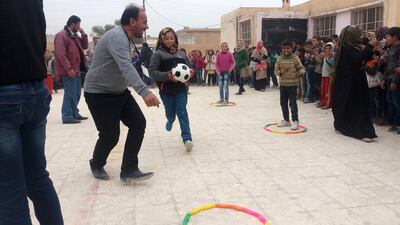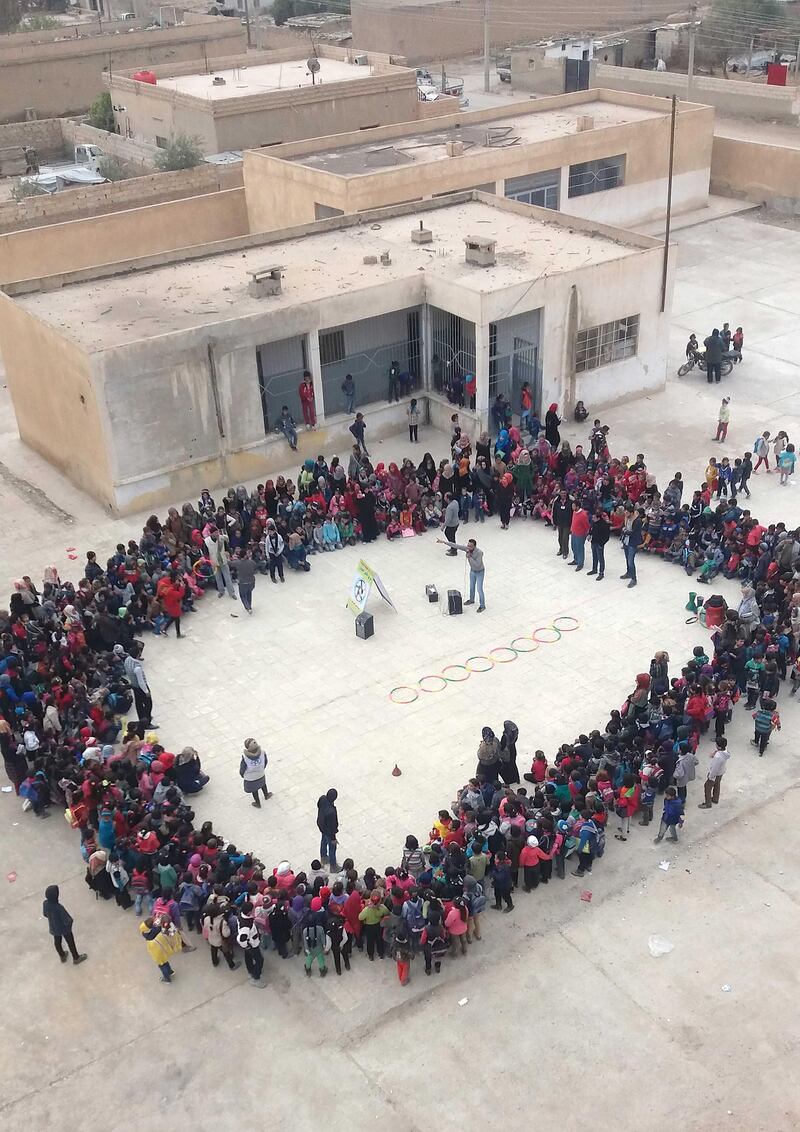A children’s rehabilitation centre in north-eastern Syria has warned of an ISIS revival unless the international community battles the militants' ideology that has left an imprint on teenage boys and girls, and the effects of group's brutal rule on young children taken to the war-ravaged country by their parents.
The group's dogma will be hard to erase and may allow the group to re-emerge again if it is allowed to perpetuate, Together of Algarnya, the Raqqa-based centre, told The National.
"ISIS's ideology still exists," Mahmoud Al Mabrook, a Syrian activist and manager of Together for Algarnya, said.
"Although it has been defeated militarily, the threat it poses is evident in north-eastern Syria."
Faltering diplomatic efforts to end the Syrian war and Turkey's offensive against the Syrian Kurds has raised fears that ISIS could become emboldened again, like it was in 2014 when it overran large areas of Iraq and Syria.
Mr Al Mabrook's centre has hosted more 15,000 children since it launched in 2017, many of them whose parents were members of ISIS. Their ages range between 7 and 18.
It aims to rehabilitate children back into normal society and give them the opportunity to enrol in primary or secondary schooling.
At the centre, children are taught about morality, peaceful co-existence and how to interact with one another. It also hosts reading, maths and psychological support programmes after they spent prolonged periods of time living under the terror group's rule.
But Mr Al Mabrook said the centre prioritises helping children whose parents were ISIS members.
“Since 2017 we received 603 children who were illiterate, 434 children who were innumerate, 995 children who needed psycho-social support," he said.
"We have a mobile team that managed to enrol 13,393 children in our programmes."
The team visits schools to “support their educational system and to enable the children to perform recreational activities", Mr Al Mabrook said.

“If we feel the child requires more time, then we would extend their program. Our main focus are on children who attended schools run by ISIS or whose families belonged to the group,” Mr Al Mabrook said.
It will take years of hard work to reverse the indoctrination that ISIS conducted on children living under its rule, he said.
“There are many families in north-eastern Syria that still accept ISIS over the regime," Mr Al Mabrook said.
"Many chant, ‘ISIS, not the regime’, and this is worrying. It will mean that ISIS could make a comeback one day."
Civil activists who train children hope their programmes will turn them into “non-threatening citizens who could one day rejoin society".
Although US President Donald Trump claimed a total defeat of ISIS this year, Syria’s activists say what remains of the terrorist group is here to stay.
ISIS has suffered significant setbacks over the past two years, losing all of its territorial control and returning to its roots as an insurgent group with guerrilla tactics.
US officials believe Al Hol camp, managed by the Syrian Democratic Forces, an Arab-Kurdish coalition, with little aid or security, is evolving into a centre for ISIS' ideology to thrive and a breeding ground for future terrorists.
Mr Al Mabrook said almost 800 families with ISIS members have recently left Al Hol and returned to their area of origin.
“Each family has at least two or three children," he said. "They have not been enrolled in any of the rehabilitation programmes."
There are several other civil society groups that operate around the city. The Enmaa Centre in Al Karama, east of Raqqa, is housing about 70 children with special needs.
Since 2017 it has co-operated with schools around the city to raise the standard of education and enable a large number of children to enrol, said Ahmed Al Hashloum, director of Enmaa.
“We have a child centre that seeks to provide an educational environment that is friendly and safe for the children," Mr Al Hashloum said.
"We also provide psychological support through various activities such as painting, music and sports."
The centre also has a mobile psycho-social support team.
“We work to provide a safe and stable life to the children by giving them work and projects that ensure they achieve their full ambitions and talents,” Mr Al Hashloum said.
In March, the group opened a community centre that promotes citizenship, reconciliation and civil peace, and a culture of dialogue and shared decision-making.
But like many aid groups operating in the area, the centre said it was running low on funds, especially as donations had been halted for now.
“We cannot operate without any capital,” Mr Al Hasloum said. "Although we have volunteers, it is still not enough.”






